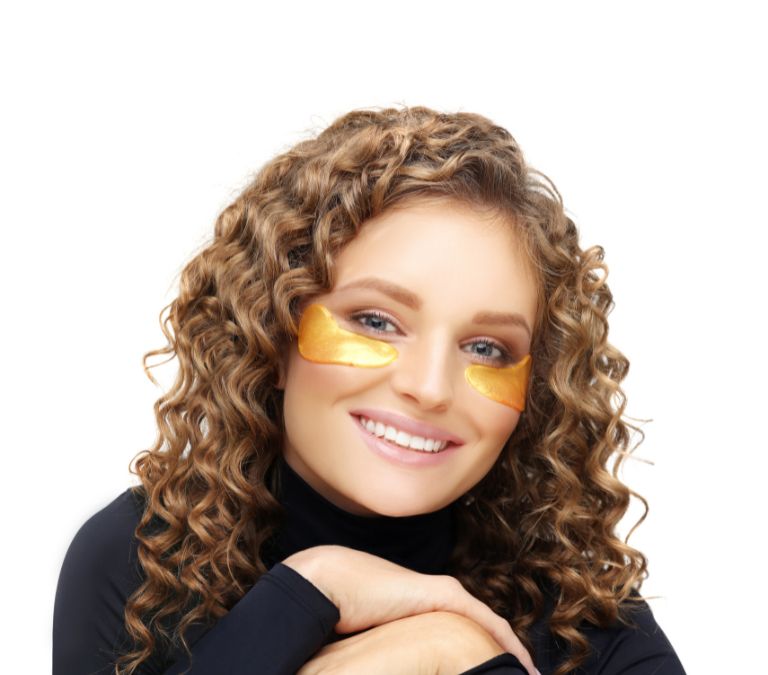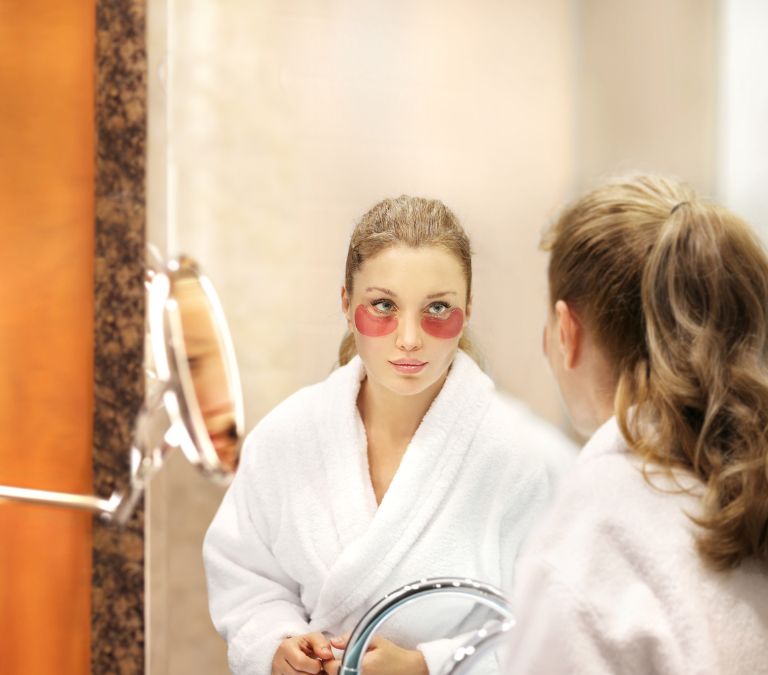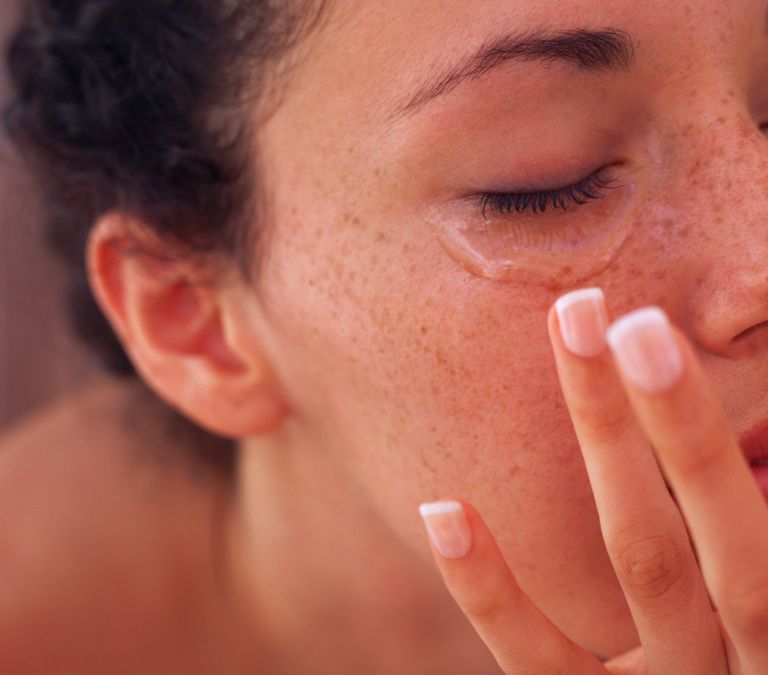Almost all of us will experience puffy eyes at some point. So you’re not alone if you wake up to see puffy eyes staring back at you in the bathroom mirror. They’re common and can be challenging to address due to the wide range of possible causes. Because our eyes are the first thing people notice about us, it’s natural to want them to be as vibrant and beautiful as possible. Let’s find out what causes puffy eyes and ways that could help get rid of those annoying eye bags.
What are Puffy Eyes?

Puffy eyes, or as it is scientifically called, periorbital puffiness, is an inflammatory response resulting in temporary swelling, which is often caused by seasonal allergies, consuming too much salt or alcohol, which can dehydrate you, causing water retention and swelling in the face. There are also other factors that we will discuss in this article.
What Causes Puffy Eyes?
Puffy eyes are a common sign of allergies, infections, inflammations, and physical irritation. You get those annoying puffy eyes due to excess fluid building in the soft tissues around the eyes. We will also explore other possible causes, such as:
- Not Getting Enough Sleep
A poor night’s sleep can cause your eyes to appear puffy in the morning, especially if you’re stressed. When you are stressed, your adrenal glands release cortisol, which alters the salt balance in your body. If your salt balance is off, your eyes may retain water and swell. A comfortable, long sleep does wonders for your skin, and if you don’t get at least seven quality hours of sleep, you’re more likely to have fluid and blood retention around your eyes, which can cause you to wake up with morning eye bags.
- Allergies.
Allergies can cause the release of histamine, a chemical that causes inflammation and swelling in the skin around your eyes. It could cause you to rub your eyes even more, leading to puffiness. Allergy season is synonymous with watery, puffy eyes. The good news is that over-the-counter medications for allergies, colds, or sinus infections can help dry up your puffy eyes and runny nose.
- It’s That Time of the Month
Do you know how bloated you feel during PMS week and even during those first few heavy-flow days? The same effect can cause swelling in your eyes. It has to do with the hormonal changes occurring now; changes in estrogen and progesterone cause fluid retention throughout your body. The good news is the swelling should start to go away as your period ends.
- You Cried
I know it seems obvious, but here’s the science: Crying happens when your eyes’ lacrimal glands work overtime to produce tears. When this gland produces tears, the tears get less salty and watery, making the surrounding tissue react by puffing your lids.
- You Drank a Bit Too Much
Alcohol draws water from your skin. When the delicate area around your eyes is weakened, it is more likely to sink into a pouch. If you wear one, drink plenty of water before bed and apply a moisturizer around your eyes. Drinking too little water or taking too much alcohol can cause puffy eyes as your body attempts to store as much water as possible.
- You Don’t Move Enough.
Fluid can collect on your face if you’re sick or injured, especially if you’re laying down. In this case, it’s best to sleep as upright as possible to allow fluid to drain. Moving around and exercising regularly also helps increase circulation and get the juice out of your face.
- Aging
Eye puffiness can also occur naturally as part of the aging process. As you age, the membrane meant to keep the fatty tissue protecting your eyes gets thin, resulting in puffy eyes, dark circles, and bags under your eyes.
- Eating Too Many High-Sodium Foods
Water will always find its way from low-sodium areas of your body to high-sodium places. A good example is the area around your eyes. That’s why a salty dinner frequently results in morning puffiness. Excessive salt consumption can cause fluid retention in the tissue around your eyes and the rest of your body.
Reduce the quantity of salt you consume daily to help relieve under-eye swelling. Processed and packaged foods with added salts should also be limited or avoided. Drink plenty of water to help flush the sodium out of your system.
- Sleeping With Makeup On.
Sleeping with your makeup on isn’t a good idea for many reasons. To begin, if you sleep with mascara or other eye makeup on, you may:
- Irritate them
- Have an allergic reaction
- Develop an infection resulting in redness, puffiness, or other symptoms
Some say that failing to wash your face can cause wrinkles or harm your skin differently. So, how exactly? You expose your skin to free radicals when you sleep with makeup on. It can cause oxidative stress, which could prematurely age your skin.
- Smoking
Want another reason to quit smoking? Cigarette smoking can dry out and weaken the skin on your face. Smoking depletes the vitamin C bank in your body, which is responsible for forming healthy collagen in your skin. Say no to cigarettes and avoid wrinkled, droopy eyes.
- UV Rays
Too much sun exposure causes the skin around your eyes to sag or wrinkle. Wear sunscreen, sunglasses, and hats to shield your face from these UV rays.
- Clogged Sinus
Clogged sinuses can also cause puffiness underneath your eyes. The pressure can give you a headache and make you feel crappy for the rest of the day.
- Genetics
Genetics can also cause the appearance of puffy eye bags under their eyes. This puffiness is not temporary. Medical treatments, such as an eyelift, are typically the only practical options for correcting the saggy appearance.
- Graves’ Disease
Graves’ disease can cause eye puffiness as a result of thyroid problems. This condition results in hyperthyroidism (overactive thyroid). It primarily affects the eyes in some cases.
Graves’ disease can cause the muscles around the eyes to swell and the eyesight to protrude. It gives the appearance of puffiness. It can also cause double vision, unlike other causes of eye puffiness.
Symptoms are managed through the following methods:
- Wearing protective eyewear to reduce light sensitivity
- Cold compresses are used to reduce swelling.
- Using special glasses to help with double vision
- Take medication as directed by your healthcare provider to prevent eye swelling and bulging
- Dehydration
Dehydration exacerbates all skin problems, making them appear worse than they are. The skin may retain water even when the body is dehydrated, depending on the body’s salt balance. Furthermore, dry skin draws attention to normal hollows and fat pad protrusions.
Gently pinch the back of your hand to see if you’re dehydrated. If it takes longer to snap back, your skin lacks elasticity or turgor.
The best way to avoid dehydration is to drink plenty of fluids daily.
Because of their high water content, some foods, such as watermelon and spinach, can also aid in hydration. A hydrating eye cream containing ceramides and lipids can also help hydrate the eye area and reduce swelling.
- Poor Contact Lens Care.
If you wear your contact lenses for an extended period, you may develop puffy eyes. A contact lens can act as a barrier to the eye, preventing adequate oxygen from reaching it. Your cornea may swell or puff up as a result of this. Sleeping with your lenses increases the stress on the eye, which can cause puffiness.
- Eye Infection
A few eye infections can result in puffiness. Among the most common are:
- Viral conjunctivitis (pink eye) is an inflammation or infection of the conjunctiva, the membrane that lines the inside of your eye.
- Blepharitis is an eyelid inflammation that causes dandruff-like pieces on the eyelashes.
- An infection of the oil glands characterizes stye. It causes a lump under the lower eyelid.
- Eyelid infections may be caused by a specific bacteria overgrowing on the skin. And treating the underlying cause will alleviate puffiness.
If you suspect an eye infection is to blame for the swelling, schedule an appointment with an optometrist as soon as possible.
You may also be wondering what causes puffy eyes in the morning? Well, we don’t blink while sleeping, which is one of the causes of the swelling of the eyes.
Blinking your eyelids is the equivalent of walking for your legs.
Closed, non-blinking eyelids during sleep may swell in people prone to this problem. As a result, you may awaken in the morning with unusually swollen and swollen eyelids. Some swelling may subside an hour after you open your eyes and begin blinking.
Why Do Puffy Eyes Occur in Menopause?

Menopause comes with a lot of hormonal fluctuations for us. These hormonal fluctuations lead to the skin around your eyes getting thin due to the low estrogen levels and collagen production. All these results in puffy eyes, lines, and wrinkles. It could be a scary thought, but we will discuss ways you can get rid of puffy eyes or, at the very least, make them less noticeable.
10 Ways To Get Rid of Those Puffy Eyes
Now, let us take our discussion further. How do you get rid of the puffiness?
- Try Cooling the Area
Applying a cold compress to your eyes may help reduce puffiness. A regular cold cloth works, or you could experiment with cooling gel pads.
Because it reduces blood flow, anything cold can help with inflammation and swelling. As a result, a cold compress, an ice pack, a bag of vegetables, or even refrigerated or frozen spoons may be effective. There are numerous cold compress eye masks on the market. Alternatively, soak a towel or washcloth in cold water and place it over the eyes for 5–10 minutes.
- Change Your Diet
Reduce the quantity of your sodium intake as much as possible. It means consuming fewer processed foods such as cheese, bread, cured meats, and instant soups. Instead, make an effort to eat more fresh veggies and fruits. The consumption of potassium-rich foods like beans, bananas, yogurt, and leafy greens can also help reduce water retention around your eyelids. Eat no more than the recommended 2,300 mg of salt per day for overall health and reduce those puffy eyes.
The muscles and tissues around your eye get weak as you age. It means that your skin, including the fat around your eyes, may begin to sag. Increasing your vitamin C intake helps your body absorb more hyaluronic acid. This essential acid is found in the body naturally, but the amount stored decreases with age.
Foods packed with vitamin C and amino acids can also increase collagen production by increasing hyaluronic acid levels, resulting in healthier skin—Vitamin C-rich foods include oranges, red peppers, kale, strawberries, and broccoli.
- Sleep More.
Lack of quality sleep can cause puffy skin under your eyes. Inadequate sleep weakens the muscles around your eyes. It can also cause collagen to be lost under the eyes. It causes fluid to collect in the area, causing swelling beneath your eyes. Puffy eyes caused by a lack of sleep can last from a few hours to 24 hours.
Symptoms could become permanent if you don’t get enough sleep regularly. You should create a sleep schedule that ensures you get about 8 hours of good beauty sleep. It would be best if you also tried to avoid drinking caffeine at least six hours before bedtime, eat dinner about three hours before bedtime, finish exercising at least a couple of hours before bedtime, and avoid looking at electronic devices like your phone or laptop for one or two hours before bedtime.
- Water Is Your Friend
One of the best ways to stop your body from storing fluids and preventing puffy eyes is to drink lots of water. Drink at least eight glasses (shy of two liters) of water daily to keep your skin hydrated, and your eyes look bright.
- Try Cucumbers, Potatoes, or Tea Bags
With your eyes closed, place a couple of cold cucumber slices over your eyes. Asides from being high in antioxidants (which greatly help reduce irritation), the cold can help reduce the appearance of puffiness in as little as 30 minutes. It is an excellent option if you don’t want to spend money buying cooling undereye gel pads but still want similar results. They’re a tremendous DIY eye mask you probably already have in your fridge and shouldn’t be too cold for your eyes.
Caffeine is the main reason you would want to use teabags. Caffeine is present in most varieties of black tea, and there is some evidence that it can penetrate the skin, reduce puffiness, and increase circulation. To try this method, wet two tea bags, refrigerate them for 20 minutes, and place them on your eyes for around 20 minutes.
Potatoes are beneficial to your skin because they contain antioxidants, vitamins, and minerals, which provide your skin with much-needed nutrients. These ingredients nourish the skin around your eyes, from active enzymes to vitamin C to starch. It aids in the reduction of inflammation around the eyes.
Vitamin C aids in the removal of puffiness around the eyes. Swelling around the eyes is caused primarily by inflammation in the blood vessels, and potato soothes the eyes and reduces the pigmentation around them. Cut a refrigerated potato into two thin slices and place them on your eyes for around 20 minutes.
- Derma rollers
One of the simplest and most effective dermatological treatments for puffy eyes is dermal fillers. Rollers are fantastic for stimulating collagen and reducing wrinkling and droopiness. Because it only works on the top layer of skin, it may not get as far as the puffiness deeper beneath the skin. Just try not to roll too much, as this can cause more puffiness. Make sure you visit a board-certified injector who is well-versed in this procedure. The effects of dermal fillers can last anywhere from three months to a year.
- Taking Anti-Histamines
A daily antihistamine should do the trick; if allergy season is terrible for you, it’s best to take allergy medication as a preventative measure. An allergic reaction could cause a sudden onset of puffy eyelids. When an allergen triggers histamine, whether it’s an airborne allergen like pollen or an applied allergen like eye makeup, the eyes can swell.
If allergies are to blame, taking an antihistamine or using antihistamine eye drops should reduce eyelid swelling. It is also worth noting that itching is a common symptom if the cause is allergy-related. However, it is important to note that allergic reactions to certain eye drops or specific ingredients in some antihistamines, such as Benadryl, are possible. If you have a known allergy to any particular antihistamine, or if you develop swollen eyelids after eye drops, stop using them.
- Sleeping with your Head Elevated
While sleeping, try elevating your head with extra pillows. Using two or more pads should suffice. You could even consider investing in a specialized wedge pillow. What is the procedure for this? Elevating your head helps prevent fluid accumulation in your lower eyelids, which causes puffiness while sleeping. If propping your head up hurts your neck or you can’t rest, consider elevating the entire top end of your bed by a few inches. You can use bricks under the bedposts or purchase notable bed risers.
- Laser Resurfacing
This treatment employs laser technology to remove the surface layers of wrinkly skin around the eyes and stimulate new collagen growth. It results in firmer skin. The results can last for years, depending on your skin type and sun exposure.
- Try Massaging Your Eyes.
An eye massage can reduce puffiness by encouraging circulation and fluid drainage. You can run their fingers through ice-cold water, place your index finger on the bridge of the nose (under the brow), and massage the under-eye area. Tap the skin gently with the middle fingers to get the blood flowing. You can even use a jade roller or a metal spoon to massage your eyes. Put one in the fridge overnight and use it in the morning to gently apply pressure under your eyes. It has the potential to cool the area and constrict blood vessels.
Conclusion
You may notice puffy eyes from time to time due to various factors such as fluid retention, lack of sleep, a poor diet, seasonal allergies, and skin aging. As discussed, there are things you can do right now to help combat this common skin concern. You can reduce the appearance of puffy eyes by changing your lifestyle.
Whether your puffy eyes result from a lack of sleep, dehydration, or genetics, there are both drastic and straightforward solutions you can try. Lifestyle changes like getting enough quality sleep and drinking plenty of fluids can help but consult with an experienced board-certified dermatologist or plastic surgeon if you require more severe treatment.
If you have long-term puffiness or pain, irritation, or severe swelling in the area around your eyes and suspect that allergies or a medical condition are to blame, make an appointment with your doctor for professional medical advice. If you have chronic eye puffiness, consult your doctor about treatment options such as cosmetic surgery. Puffy eyes can signify a more serious condition in some cases. See your doctor if you suspect that your puffy eyes result from something else.







